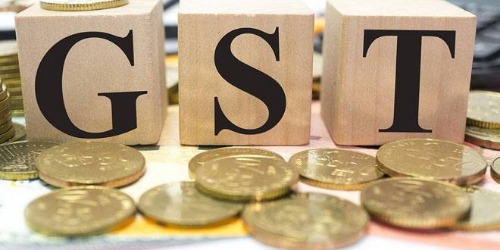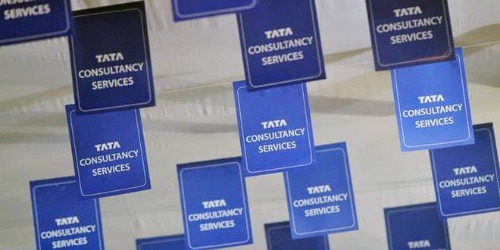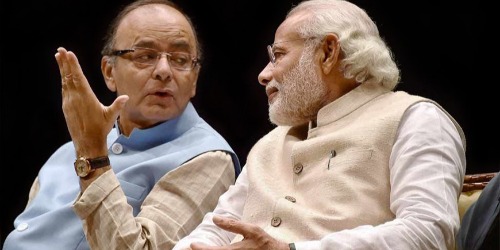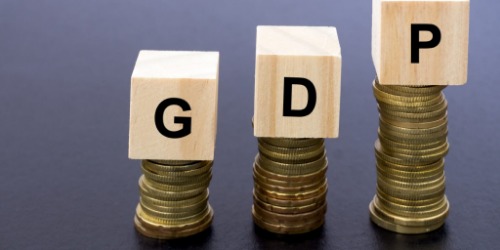Businessmen with GST / compositions are also taxing customers, the government will make people aware

Those traders who have opted for composition under GST can not levy tax on customers. Despite this, many business customers are taking GST. But, do not make deposits with the government. To prevent this, the Ministry of Finance is going to be vigilant.
An official of the Ministry said that for composite schemes registered dealers and service providers, it would be necessary to tell on the bill that they are in the composition category. They will not be able to take tax from the buyer. The Ministry of Finance will also run a campaign to educate customers about this.
Customers will be advised that those who are under the Corporate Composition Scheme can not take GST. A total of 1.17 crore companies are registered in GST. Of these, 20 lakhs have opted for composition.
Committee will consider the decline in GST revenue of states
-
Deputy Chief Minister of Bihar Sushil Modi has been made the Chairman of the GST Committee on Revenue. The seven-member committee will consider the decline in the revenue of states after GST and will suggest ways to increase it.
-
Most states including Punjab, Himachal Pradesh, Chhattisgarh, Bihar, Gujarat and Rajasthan have complained about the decline in tax. During April-November, their tax collection decreased from 14 to 37 per cent.
-
After the GST came into force, only GST collections in Andhra Pradesh and North-Eastern states of Mizoram, Arunachal, Manipur, Sikkim and Nagaland increased. For the April-November 2018, the Central Government gave 48,202 crore rupees as compensation to the states, in the year 2017-18, 48,178 crore was given.
The limit of composition increased to Rs 1.5 crore from April Will be
-
Currently, businesses with turnover of up to Rs one crore can go to composition. GST Council decided to increase this limit to 1.5 crore in the last meeting. It will be applicable from 1st April, 2019
-
Under the new arrangement, service providers with turnover up to Rs 50 lakh will also be able to opt for composition. Until now only restaurants businessmen could go to compositions in the services. They have to pay 5% tax.
-
Composition businesses have to pay 1% tax on the whole turnover. There is a provision for returning every quarter for them. It will be annually from the next financial year. However, they will have to pay tax every quarter.
- 2
- Leave a comment
Income of TCS increased, but margin decreased

Tata Consultancy Services's earnings has risen steadily in the third quarter, but due to rising hiring and contracting work in the US, its margins have come down. TCS results are also showing signs of similar pressure on other companies. Indian IT companies are making huge recruitments in the US because H-1B work visas have become difficult to meet. In addition, IT companies have to deploy more employees for projects in areas like Digital Technology. This is also increasing the cost of other IT companies, including TCS.
TCS's earnings in the December 2018 quarter stood at $ 5.25 billion. This has led to an increase of 1.8% in the currency compared to the previous quarter, removing the effect of the volatility in the currency. TCS's earnings in rupee stood at 37,338 crore in the quarter. Net income of the company reached $ 1.14 billion i.e. 8,105 crore However, the operating margin of TCS dropped to 25.6% in the December quarter, from 26.5% in the previous quarter (July-September).
Company CEO Rajesh Gopinathan said after the result, "We are getting a lot of work. We are investing to fulfill this. The reason for the reduction in margins is the employee cost. This includes the effect of hiring and sub-contracting. ' They also said that the recruitments the company has made will benefit further. TCS had earlier said that it would try to keep the margin between 26-28%. So margin is reduced even in the December quarter, but it has not gone beyond this scope. TCS's rival Infosys also reduced the margin target from 23-25% to 22-24%. He is also going to have more local hiring in the US and the company is also investing to increase business.
BNP Paribas' Sanjeev Ganguly on the results of TCS said, "The results of the country's largest IT company are in line with the expectation in the December quarter. However, the margin remained below our estimate. ' The problems of IT companies can increase due to Bregit. Analysts are also expecting a recession in America. By the way, TCS said that the slowdown has not yet been impacted by it and its clients have not given any sign of cost reduction. TCS's earnings in North America rose 8.2 percent in the December quarter, which is less than the overall 12.1 percent growth of the company. The company said that it has received work of $ 5.9 billion in the third quarter. 8 clients of $ 10 million found in this quarter. Now their total number has increased to 45. The number of clients with $ 5 million has gone up to 99, of which 5 grew.
Preparation of tools for the middle class with deduction of tax and home loan after the general reservation

After the announcement of 10 percent reservation for the upper castes before the Lok Sabha elections, the Modi government of the Center can make some more prominent announcements to vote for the upper castes. According to sources, after reservation for the poor, the Modi government is now preparing to give a moderate concession in the home loan as well as declaring the middle class a big discount in the income tax.
According to the report of Business Today, the Central Government can make the announcement through the upcoming interim budget 2019. It is worth mentioning that after nearly three weeks, Union Finance Minister Arun Jaitley will present the interim budget.
According to sources, the Finance Minister can announce a major change in the tax slab under Section 80C of the Income Tax Act. At the same time, the central government can declare the reduction in home loan rates along with additional tax rebates for pensioners.
GDP / India's growth rate is estimated at 7.2%, in the previous financial year, the rate was 6.7%

India's growth rate is likely to be 7.2% in current fiscal year 2018-19. This figure was 6.7% in the last financial year. Due to improvement in the agriculture and manufacturing sector, this time the estimation of GDP rate has increased.
The Central Statistics Office said in the figures released on Monday that the growth rate in agriculture, forestry and fishing sector is expected to be 3.8% compared to 3.4% of the previous financial year. The manufacturing sector is also expected to grow at 8.3% in 2018-19 compared to 5.7% in 2017-18.
New Rules From February 1 Likely To Impact Amazon, Flipkart

Tightening norms for e-commerce firms having foreign investment, the government on Wednesday barred online marketplaces like Flipkart and Amazon from selling products of companies where they hold stakes and banned exclusive marketing arrangements that could influence product price. The revised policy on foreign direct investment in online retail, issued by the commerce and industry ministry, also said that these firms have to offer equal services or facilities to all its vendors without discrimination.
The revised norms are aimed at protecting the interest of domestic players, who have to face tough competition from e-retailers having deep pockets from foreign investors, the ministry said. The policy would be effective from February 2019.
"The move would completely prevent influencing prices by e-commerce players. This will also ensure better enforcement of FDI guidelines in e-commerce companies," a senior official said.
The policy says a vendor will not be permitted to sell more than 25 per cent of its products on an online platform of a single e-marketplace firm.
Inventory of a vendor will be deemed to be controlled by e-commerce marketplace entity if more than 25 per cent of purchases of such vendor are from the marketplace entity or its group companies
It further said that these companies will have to file a certificate along with a report of statutory auditor to the RBI, confirming compliance of guidelines by September 30th of every year for the preceding fiscal. The decision comes against the backdrop of several complaints being flagged by domestic traders on heavy discounts being given by e-commerce players to consumers.
According to the current policy, 100 per cent FDI is permitted in marketplace e-commerce activities. It is prohibited in inventory-based activities.
Welcoming the move, Snapdeal CEO Kunal Bahl tweeted that "Marketplaces are meant for genuine, independent sellers, many of whom are MSMEs. These changes will enable a level playing field for all sellers, helping them leverage the reach of e-commerce". Amazon India spokesperson said: "We are evaluating the circular".
A senior e-commerce industry executive of another company said that the move could adversely impact investments being made to bring new sellers on board.


